Nigeria elections: Mixing religion and politics
- Published
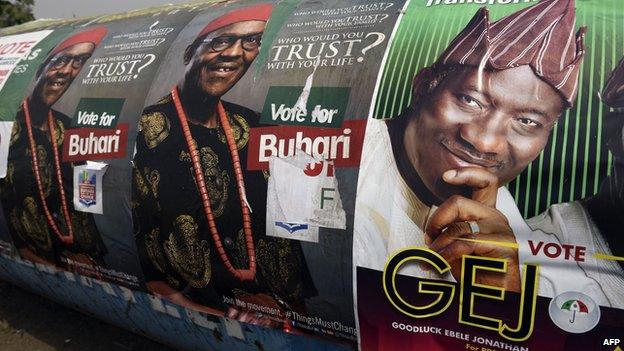
President Jonathan and his challenger Muhammadu Buhari are appealing to the religious vote in Jos
As tensions rise ahead of elections in Nigeria, some fear the country's unity will face a new test and divisions will be exacerbated by a vote which sees a Christian presidential candidate from the south, Goodluck Jonathan, facing stiff competition from Muhammadu Buhari, a Muslim candidate from the north.
It is not their first face off but is likely to be by far the most closely contested.
But to what extent will voters pay attention to the religion of the candidates?
"If the Christian leader does not have what it takes to provide good leadership I will not vote for him merely because he is a Christian," says Arome Okwori at his home in Jos where the Christmas decorations still twinkle.
"However, I will make a choice between that Christian leader and a Muslim leader who may not guarantee freedom of religion… so to that extent I may lean to the Christian leader but that is not how it should be," the father of two young children adds.
He says he knows many other Christians who fear that Mr Buhari has a hard-line Islamist agenda and wants stricter implementation of Sharia - Islamic law is already in place across the north.
"Gen Buhari believes in the secular nature of Nigeria," says Lai Mohammed, a spokesman for his All Progressive Congress (APC) party.
"He is not a religious bigot. He is not a fundamentalist. That is mischievous talk."
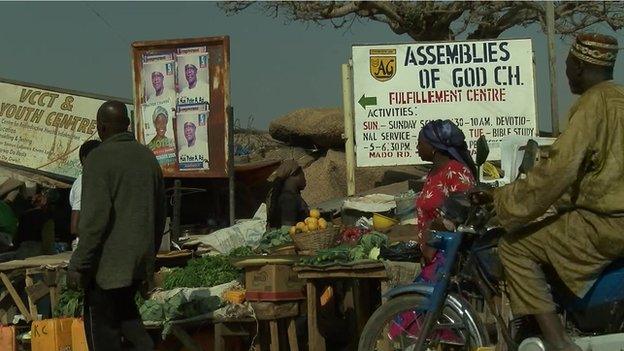
Jos straddles Nigeria's north and south; in its capital neither churches nor mosques are hard to find
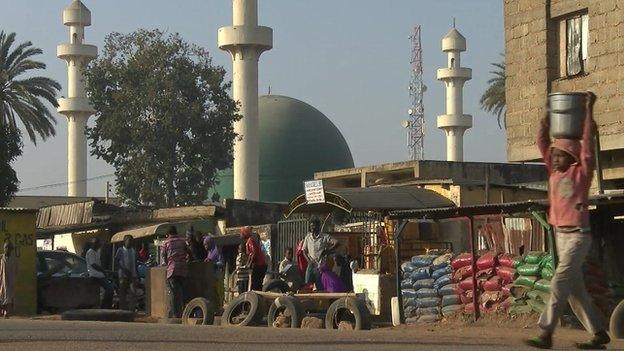
Jos is like a microcosm of the whole nation
There are Nigerians, and by no means only Muslims, who say President Jonathan is too close to some of the hugely popular "super pastors" who have grown rich from their Pentecostal churches.
Nigerians are notoriously religious and the voting patterns will once again no doubt look very different in the predominantly Muslim north compared to some areas in the south where more Christians live.
"You can never divorce the religious sentiment from a typical Nigerian," says Khadijah Hawaja Gambo, a white veil framing her face.
"But the way things are going people are beginning to downplay the role of religion in deciding who you vote. I hear people talking a lot about credibility," she says.
The Muslim mother of six adds that she wants a leader who can end the insecurity in Nigeria and "take the country back to where it used to be with people co-existing peacefully, not the kind of Nigeria we are seeing today".
'Heart over reason'
Jos is in a way a microcosm of the whole nation, straddling the north and south.
It is religiously mixed and in some ways divided along those lines.
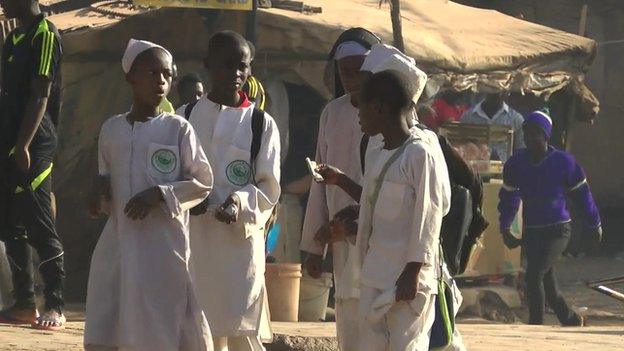
Children in Jos city heading home from school, but Islamic dress is not dominant everywhere
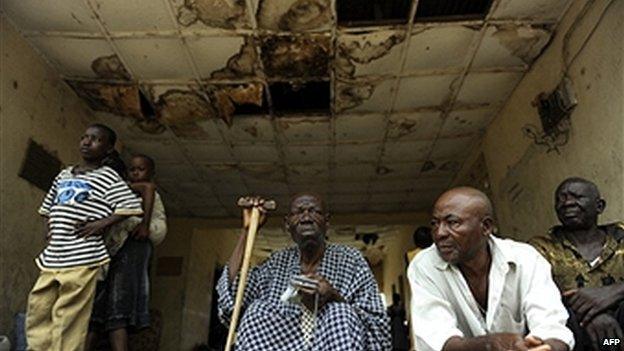
Many Nigerians fled the violence that followed the 2011 election
There are parts of the city where the influence of Islam is visible and audible - with calls to prayer from the mosques as veiled school children head home.
Other areas are dotted with signs for "The Blessed Hair Salon" and churches of all shapes and sizes whilst you will see fewer hijabs and more jeans on the streets.
The danger comes when religion is mixed with politics. It is worth remembering 800 people died in northern Nigeria during clashes after Mr Buhari's loss in the 2011 election.
"Religion by its very nature and content appeals not so much to reason. It's a heart matter and carries with it huge emotions," says Archbishop Benjamin Kwashi, who has played a key role diffusing religious tension in Jos.
Archbishop Benjamin Kwashi explains how politicians use religion for their own political gain
"When religions like Christianity and Islam have a huge following of hungry not very educated people on both sides then politicians will explore the areas of religion to get them on their sides. That's a very dangerous and bad thing to do. It's not fair and it's not right," the Anglican archbishop of Jos says.
The whole of Plateau state has tasted the combustible consequences when politicians focus on faith.
Deadly clashes have erupted since 2001 and have been rooted in disputes over access to land, power and jobs between the so-called "indigenes" who happen to be mostly Christian and "settlers" who are largely Muslim.
Religion is not the primary trigger but politicians have used it for their own gain.
'Divide and rule'
"There was never a time in the history of Plateau or anywhere in Nigeria where a Christian stopped a bus to find out if the driver was a Muslim before boarding or saying you want to know whether the maker of the cloth in a market is a Muslim or Christian," says security analyst Abdullahi Bawa, who feels some politicians are better off if they do not have to campaign on real issues.
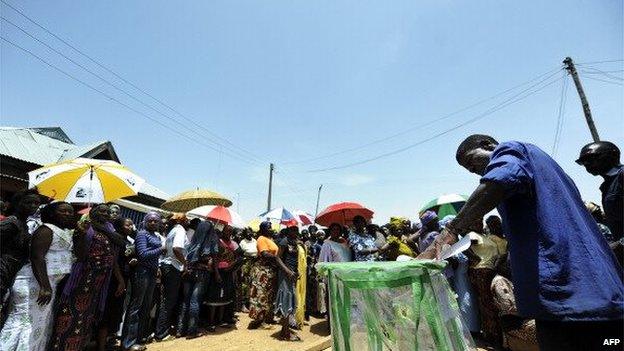
More than 68 million Nigerians have registered to vote in February
"It is their own kind of local divide and rule. By the time they discover people will unanimously stand together for the good of all, the politicians will go and use the sentiment of tribe, region or religion."
"Once the people are divided the politicians will have a good ride while the greater majority will be wallowing in depravation," says Mr Bawa, who is also executive research associate of Network For Justice.
He says people have now come to understand the game the politicians play and this is why there is now more peace on the Plateau.
As some voters look at the religion of the candidates as they try to make up their minds, they may come across politicians of any faith who are willing to thank them in advance for their vote with a gift.
"Money and religion in politics, they go together," Archbishop Kwashi says.
"When you find unscrupulous politicians who are just desperate for an office - not for what they will do for people they just want the office for what they can get for themselves - to retain the office at all costs they will use anything.
"They will use money and the religious sentiments to do that."
Prayers for peace
It is the desperation of the politicians and their parties which raises the stakes and tension.
There will be plenty of prayers for peace in Nigeria's mosques and churches.
But it will largely be up to the politicians to reduce the tension and ensure there is harmony across the religious divide of this diverse nation.
Many voters dream of a day when the electorate is better educated and can see beyond the tricks of the candidates.
"I am hoping we will get to a stage where these differences that politicians easily manipulate that are not relevant to the quality of leadership will become less and less important," says Mr Okwori, the Chrisian lawyer in Jos.
"Then we can look at people on the strength of their policies and the quality they can provide.
"If you are well informed you know about issues that are much more important than 'my man (from my own religion) is there.'"